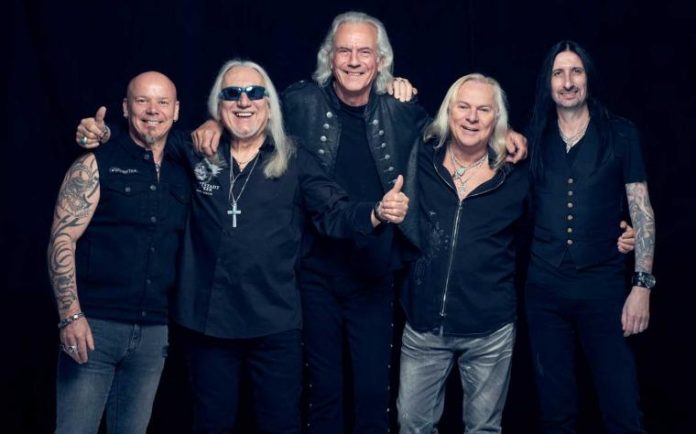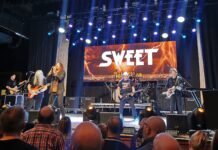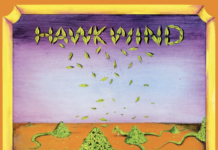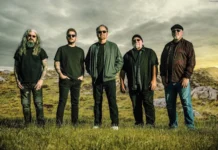The mighty Uriah Heep have been in existence for close to 52 years and are one of the pioneer bands who helped create the template for classic heavy rock in the early seventies. Alongside Purple, Sabbath and Zeppelin they released a series of albums now considered classics and, for a time, they bestrode the world as rock dinosaurs, selling millions of albums and playing stadia all over the world. Songs like ‘Gypsy’, ‘Sweet Lorraine’, ‘Look at Yourself’ and ‘Easy Livin’ are all rock standards and still a part of Heep’s live set today.
In the late seventies, their star waned somewhat after the loss of original vocalist David Byron and, in particular in 1980 when main songwriter Ken Hensley, who with Jon Lord and Mark Stein (Vanilla Fudge), wrote the book on using the Hammond organ in a rock band, left the band, and they spent a number of years in the wilderness, though still popular in many far-flung places around the globe, but the past decade has seen them restored to the pantheon as a new generation of fans has caught up with the Heep.
Bassman Davey Rimmer is a relatively new boy, having only joined Uriah Heep in 2013, initially standing in for ex-Spider From Mars Trevor Bolder while he was being treated for pancreatic cancer, and soon afterwards, joined full-time to become the Heep’s seventh bass player, following such eminent predecessors as John Wetton and Gary Thain.
Laurence Todd [LT]: How did you come to join such a venerable band?
Davey Rimmer (Rimmer): “I moved from Liverpool to London in the 90’s. I played with a couple of bands and, in the early 2000’s, hooked up with Zodiac Mindwarp, toured the US and Russia and did a couple of albums with them. But, in the early 2000’s I was also playing around Camden Town in a covers band called Metalworks, all local musicians, playing songs by Metallica, Maiden, Lizzy, etc, and we played every Sunday. The band was myself, Les Binks (ex-Judas Priest, drums) and Richie Faulkener (now Judas Priest, guitar) and a couple of others. Russell (Gilbrook, Uriah Heep drummer) used to come down occasionally and watch us, sometimes get up and play. He then got the gig in Uriah Heep after Lee Kerslake left in 2007 but we kept in touch and, in 2013, he asked if I’d like to try out for Uriah Heep and fill in for Trevor, who had cancer and was about to have an operation, as Heep had a number of gigs lined up. The original plan was for Trevor to rejoin the band again in time for the Download festival in 2013 but sadly he died in May, so the band asked me to continue.
Trevor Bolder was an incredible bass player, and not just for the stuff he did with the Spiders From Mars, also with what he did in Uriah Heep. He was forceful and powerful but also very melodic, an amazing player.”
LT: When you joined Uriah Heep, did you think you were joining a ‘heritage’ band, trading on past glories, or a contemporary band with something to say and make new albums?
Rimmer: “When Russell Joined the band, the first record he made with them was Wake The Sleeper, I bought the album and it became one of my favourite Heep albums, it’s a brilliant album, with lots of old Heep but also contemporary Heep as well.
When you look at Uriah Heep, they’ve had three careers. There’s the classic seventies Heep who released some great albums, like Demon’s And Wizards and The Magician’s Birthday, which was an important time for many rock bands, which all the hardcore fans love. Then they had a kind of an eighties career, the John Lawton period and the Abominog years, and then there’s the nineties, where they made some great albums, like Sea Of Light, so if you’re a Heep fan, there’s so much music to digest.
I mean, I love the seventies period, but I also love the nineties stuff they did as well. For me, Heep were always a classic band. I saw them play at the High Voltage Festival (Victoria Park, Hackney, 2011), not realising, in a couple of years, I’d be playing with them !!”
LT: Uriah Heep have always been a hard gigging band, playing 100-120 shows per year, so the pandemic must have hit you hard.
Rimmer: “Yeah, it did. It hit every band hard. If you were a ‘live’ band, everything stopped in March 2020. When the pandemic first hit, we were in Florida playing the Legends of Rock Cruise, and we heard about this thing going off in China. We flew back after the last gig and, not long after this, we were due to start a three week tour of Russia, which was immediately cancelled when all the Covid stuff took effect.
In one way it was good as I was able to spend time at home as, in my nine years in the band, I’ve not been home more than a month at a time as we’re always gigging, touring around Europe. But when restrictions were somewhat lifted towards summers end in 2021, we did about seven festivals, all outdoors, two in the UK and five in Finland, and we had to take covid tests first. But at least we got to play, earn some money, and it was really good to get back. Lots of guys I know in bands haven’t played a show in two years.”
LT: As you mentioned, the Heep have an amazing back catalogue of music, but are there any songs from their past albums which aren’t performed but you’d like personally like to include in your set?
Rimmer: “God, there’re so many !! If you go through the albums, there’s a song called ‘Why’, from the Look At Yourself album, with a big bass solo [laughs]. There’s quite a lot of progressive stuff they used to do, stuff like Return To Fantasy, which is a great album and we did the title track recently. ‘Salisbury’ would be a great track to do. I remember Mick (Box, guitarist) telling me he’d love to do that one ‘live.’ In America, fans go crazy for the ‘Sweet Lorraine’ era. Remember the ‘live’ rock ‘n roll album? It’d be nice to bring back the rock ‘n roll medley.
But Heep have released 26 albums so putting a setlist together is hard. If we could play for three hours, it’d be great, but you’d need three hours cos you’ve got the seventies classics, the eighties period and the nineties, so we pick out the songs certain regions respond to.”
LT: For a band like Uriah Heep, there’re always those tunes the fans will expect to hear played, but don’t you ever get tired of playing tracks like ‘Gypsy’ and ‘Easy livin’ and want to play something else?
Rimmer: “No. It feels great to play those songs. A perfect example… on January 29th [2022] we played Hammersmith and the response we got from the crowd playing those songs was amazing. Certain songs and albums take you back in time, don’t they?
But we’ve changed things around a bit now. We don’t open with ‘Gypsy’ now, we changed this when the Living The Dream album came out in 2018, and we now do songs from this album, and we changed some of the older songs as well, but we still play ‘Gypsy’ and ‘Look At Yourself’ as a medley.
Hammersmith was a great night, there was Saxon, Girlschool and Diamond Head and us. We weren’t originally on the bill but Krokus had to pull out so we were asked to step in with only two weeks’ notice, which was no problem as we’re friends with Saxon and have done festivals with them, and Mick’s known Saxon forever. We only played 45 minutes as Saxon had a big production but it was a great night, it all went really well and it was great to see everyone in the crowd, almost just like normal times again!
But it wasn’t a Heep show. The tickets for this were sold a year ago, so the crowd and the reviewers weren’t expecting us, but it was great to play to a crowd that wasn’t ours, it was more like a festival crowd for us but we really connected with all the people in Manchester and at Hammersmith.”
LT: Uriah Heep have had at least twenty changes of personnel down the years, but the current line-up has been together nine years, which is the longest time in the band’s history without a personnel change. What’s contributed to this longevity?
Rimmer: “Yeah, it’s been a while, hasn’t it? When I met the guys, I knew Russell as I’d played with him a few times, and when I met the other guys I got on really well with them.
Initially, it was hard for me because they’d been in the band with Trevor for 30 years and they were very close, so I knew I wasn’t stepping into his shoes, I was respectfully standing next to them cos he was a legendary bass player. So, for me, it was all about learning the songs and making them feel comfortable, making sure what I played wasn’t too different, so I just stuck as close as I could to the original parts.
We spend a lot of time travelling on the road and playing and they just made me feel so welcome. They made it easy for me. We’re like a small family really.”
LT: How do you maintain your enthusiasm for touring and playing onstage?
Rimmer: “The enthusiasm’s always there, and it emanates from Mick. Playing in Heep is all he’s ever done in his life .. write songs, play the guitar, record albums and tour the world, and he’s done this through thick and thin, through the seventies with band members dying through drugs, different problems with large and small record labels, and the different changes in music. He’s done everything, he’s been through the book, there’s nothing he’s not been through with the Heep. But Mick’s encouragement and enthusiasm is always there, and in the band, and he’s always encouraged me to be myself.”
LT: Could the Heep survive the loss of Mick Box, for whatever reason?
Rimmer: “ I don’t think so. The band is very much Mick’s identity, isn’t it? He’s the thread that goes through their sound and through all the line-ups, and he’s still going strong, playing better than ever. The reviews for our recent shows said Mick was on fire and he’s got some great reviews for his guitar playing.”
LT: A little while back, the US magazine Rock Cellar described Uriah Heep as being “the Beach Boys of heavy rock.” Do you recognise the band from this description?
Rimmer: “Yeah. This goes back to the vocals of the early Heep albums when they had five-part harmonies. Around 1972-72, with the Hammond organ, Heep were a rock band but doing all these harmonies, so this led them to being compared to the Beach Boys. I mean, even Queen were fans of Heep in their early days because of all the harmonies, but Heep had been doing all those big layered harmonies a couple of years before Queen released albums like Sheer Heart Attack, and they did it fantastically well.
A lot of seventies musicians were influenced by the harmonies of the Beach Boys, and also of The Beatles as well. Heep had all the harmonies of these bands and just added the Marshall stacks to it.”
LT: Do you think you’ve improved as a musician since joining Uriah Heep?
Rimmer: “ Oh yeah, for me, yeah. I grew up watching Top of the Pops and listening to bands like Purple, Lizzy, Heep and Queen, and I always wanted to be in a band, so I was always practising that style of music. I played in bands doing original stuff but also played in covers bands as well so I was always used to learning parts played by other bass players. But it’s a bit different when you’re invited on stage playing with the guys who wrote some of that stuff, so doing this made me a better player, definitely.
If you’re invited to play in a classic rock band, and if you play ‘live,’ you want the fans to remember those classic songs the way they were played, and if you’re making new music, it becomes even more important. There’re also some songs with classic bass lines and you don’t particularly want to mess with them.
I’d take the original parts and play them but I’d always try to think ‘what would Gary play? What would Trevor play? and I’d have to play them slightly differently because Russell plays differently from Lee Kerslake, and playing as part of a rhythm section, you have to play together, and every drummer’s different, so you have to adapt parts according to the energy coming off the drummer. Russell can play any style, but he’s a rock drummer and he plays with a powerful force, so playing with him makes you play better because he’s so consistent in the way he plays, and as a bass player, you have to match that.
Also, playing with Mick and Phil (Lanzon ..Heep keyboard player) Hammond organ fills out a big sound, so with Mick’s classic rock guitar sound and the Hammond, the bass has to glue all this together. It’s all a matter of not overplaying and not getting in the way of the Hammond. Every bass player Heep’s ever had has been melodic .. John Wetton, Trevor, etc, ..so it makes you play better.
There’re also vocals as well because some of Heep’s songs are quite anthemic, big songs like Sunrise, so the vocals are very important and, as a bass player, I have to steer my way around the vocals as well, especially in the studio where you’re even more under the microscope.”
So, to conclude, what’s on the horizon for the Heep?
Rimmer: “Hopefully, if it all goes to plan and festival season this year goes ahead, we start playing festivals across Europe in June, covid and Brexit permitting, we can tour without all these extra pressures adding extra costs. The dates are in and the first festival’s on June 18th. We’re playing most weekends during June, July and August, and we’ll be playing our normal festival setlist for about 45-50 minutes, depending on which festival. And then there’s the fiftieth-anniversary tour starting in September, in Italy, going onto Xmas, and we have a few dates in the UK in October, including headlining at the Palladium. The set list’ll change for this as we’ll be playing songs we’ve not played for some while, possibly playing two sets with a break in the middle.
We’ve also just recorded a new album which we’re really pleased with and, hopefully, it’ll be released before the end of the year or, if not, early 2023, because we’ve got the fiftieth anniversary tour, and you don’t wanna put new material into this tour. But even if we wanted to release it in the next six months, we couldn’t because of a shortage of vinyl due of the pandemic, so there’s a backlog of bands wanting their albums put out, and we’ve gotta wait our turn to be released, so everyone’s waiting to put stuff out. So we’ll be changing our set again to include some new stuff.”
The music of Uriah Heep has stood the test of time because they’ve continued doing what a band of their stature has to do to survive, which is to play gigs and make albums, and they make new fans along the way. Uriah Heep are a long way from being a heritage act as they ‘live the dream’ they began following in 1970. ‘appy days indeed.



















It’s great that the current lineup has lasted nine years, but the longest time without a personnel change in the band was 21 years, the 1986-2007 lineup of Mick Box, Trevor Bolder, Lee Kerslake, Phil Lanzon, and Bernie Shaw.